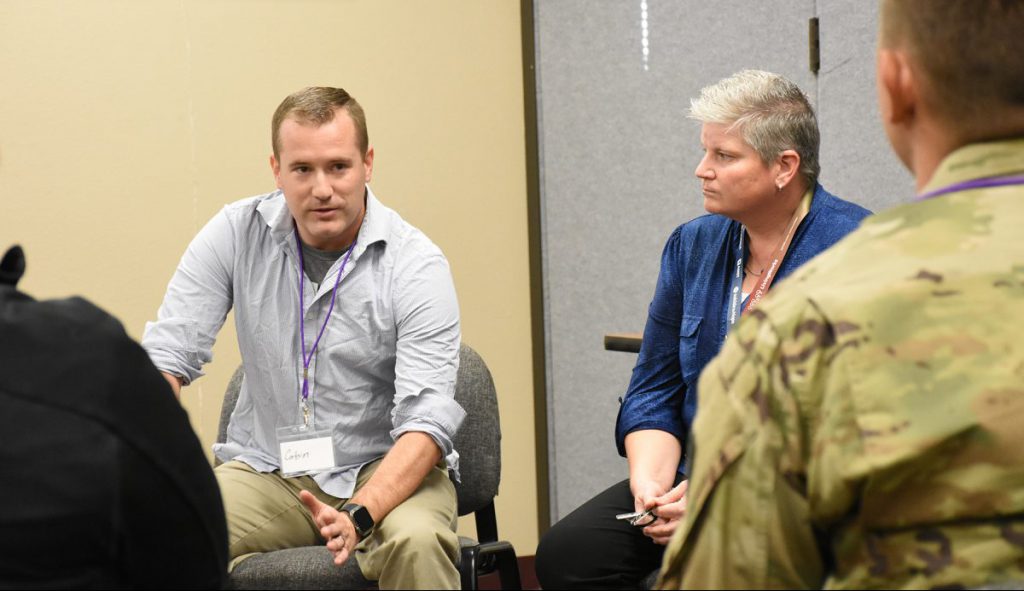Two-day suicide intervention course teaches life-saving skills

Story by Crystal Farris
Idaho Army National Guard
The Idaho National Guard hosted a two-day Applied Suicide Intervention Skills Training workshop at Gowen Field Oct. 24, for service members and employees.
A type of “suicide first-aid,” the course teaches participants to recognize individuals who are having suicidal thoughts and to work with them in creating a plan that supports their immediate safety.
“Having issues in your life does not mean they are going to end your career,” said Robert Smith, coordinator for the Idaho National Guard’s Resilience, Risk Reduction and Suicide Prevention, or R3SP, program. “Help-seeking behavior is actually a sign of strength. It is better for you to address those issues when they come up so you can get the help you need.”
Currently the Army’s ACE model teaches Soldiers to mitigate possible suicides by “asking” individuals who display suicidal tendencies if they are suicidal, “caring” for those who are, and “escorting” them to a source of professional help. ASIST takes that model a step further.
“The course educates individuals to go a step further by actually showing them what the ‘caring’ part of ACE is,” said Smith. “It also gets Soldiers and leaders more comfortable with ‘asking,’ because it’s such a difficult question to ask.”
Small-grouped open discussions offer participants an interactive environment to gain insight from other’s experiences and knowledge, in addition to familiarity with talking about suicide. The course has proven successful in Spc. Javier Wells’ experience.
Wells, a Soldier from the 1-148th Field Artillery Battalion, said he was able to assist a fellow Soldier less than a month after attending the course in April. The Soldier seemed distressed, Wells said, so he asked her if she felt suicidal. The Soldier said yes. He recalled pulling out an ASIST quick- reference tool that was stored in his wallet and immediately applied suicide first-aid.
“I wasn’t nervous at all and was grateful to have the skill set,” said Wells. “If it weren’t for ASIST I highly doubt I would’ve had that conversation. Now we are close friends and it feels incredible to have touched her life and be her support system.”
Along with learning how to apply suicide first-aid, participants also identify key elements of an effective suicide safety plan; gain an appreciation for improving and integrating suicide prevention resources within the community; discuss how personal and societal attitudes can affect views on suicide and intervention; and learn to recognize other important aspects of suicide prevention, including life-promotion and self-care.
Self-care can go a long way to help individuals prevent their own risky behavior, Smith said. Individuals can practice self-care by having an awareness of their issues and knowing when it may be necessary to seek help without worrying about possible negative consequences, he added.
“Trauma happens in life,” said Smith. “If we are resilient and have a good support system, such as individuals trained in ASIST, then we can get through those issues rather than letting them fester and grow.”
ASIST is one of various intervention resources offered through the Idaho National Guard’s R3SP program. The program focuses on giving targeted and comprehensive training in resiliency, substance abuse and suicide prevention.
Further information on the R3SP can be found at https://www.imd.idaho.gov/for-our-members/. Individuals seeking immediate assistance or having suicidal thoughts can contact the Idaho Suicide Prevention Hotline at (208) 398-4357. Counseling is also available upon request through military health professionals, the Yellow Ribbon, Family Programs and Chaplain Corps.
 Official Government Website
Official Government Website